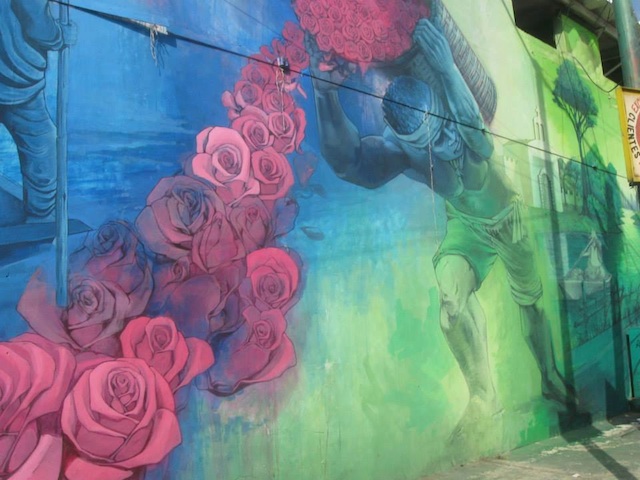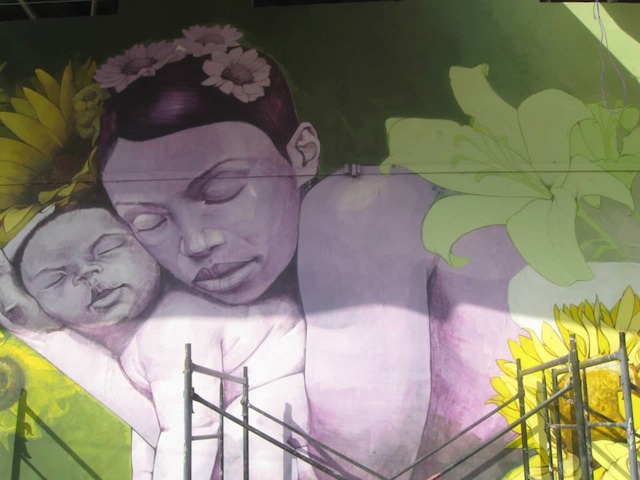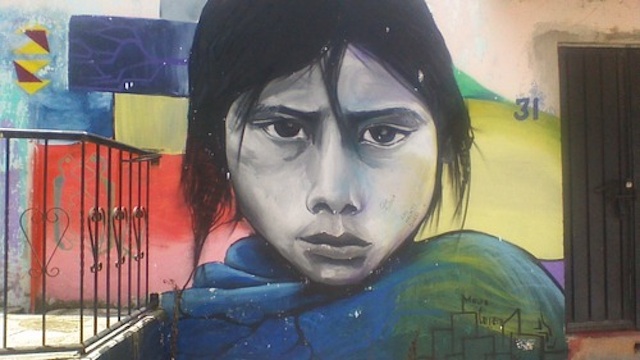Sarah Maria Medina REFLECTS ON SINGLE MOTHERHOOD
No one told you how hard this would be. That after the softness you would begin to mourn your former self. That after the forest and all the time in the woods, after the mornings and endless nights you would begin to remember a time before you went to Havana, before you went to the malecón with the sea of tottering queens and kings with swag. Before you moaned pain into the bright light of the hospital and held your wet daughter in your hands.
The sky becomes an upside down lake. This means you can stay inside, drink hot chocolate, write in your journal, and read about Frida. There has been a percussive sound for the past three hours of water drops hitting the base of the overturned pan in your small patio. The blue pan. You have begun buying blue things: blue pans, blue cups for heating milk on the stove. Not the expensive organic milk, but the almost organic San Marcos brand.
The rain makes you think of Levi. She was before Havana. Back in Seattle, she would lie in your bed, and you would trace the raised lines of her tattooed sleeves. And she stayed for a while. That was back when your hair was black, and you would wear big silver hoop earrings. You had some kind of attitude that said stay,
and
she stayed
until the summer
ended.
Now she returns to your dreams. Not always, but often enough to tell you that she resides somewhere inside you. Left ribcage between the third and fourth bone.
No one told you that this life is actually quite lonely when you are a single mother in another country where homophobia reigns, and machos swagger up from the cantina at five in the morning ranting in Spanish about how someone was just beaten. You wake, your eyes swollen to the trash bells that run by the other women already dressed, their hair combed, their aprons swung over wide tamale hips.
The rain a wash of sound, you make more hot chocolate instead of writing poetry while your daughter sleeps. (You haven’t written poetry since February in Mexico City, the night when the sounds from the street and freeway two blocks down wouldn’t stop crashing in like waves from the sea.) The milk scalds. You decide to read the story that La Poeta sent. You read about her great grandfather, and her Texas dust coats your mouth. You imagine her in cowboy boots, bolero in the desert shade, and her great grandfather across the border town. You want to try and write in second person, like her. You think that maybe you can distance yourself enough from the story to write it, distance yourself from the mountain town and the miles that stretch out toward the city: the last bus lumbering down the highway, the sound of broken cow bones against metal.
In her story, La Poeta writes about sitting in a café writing to a girl, and you wish you were the girl, but you are not her. That girl has magnolia skin and blue flower eyes. Her description reminds you of Levi, and you know that not even by reading La Poeta’s story can you escape Levi. She becomes the girl on the page swimming up to La Poeta in a turquoise pool.
Two nights ago, you met Levi in a hotel. In the dream she kissed you, said she wanted to have a family with you. You asked her if she thought it would be the same as before. And then your daughter was there in the hotel, drawing pictures at a coffee table. For a moment the three of you were happy, but then you woke to the small two-room house you have rented near the mercado. You woke to the sound of a taxi parked outside your high barred open window, to the sound of his radio static, and a stream of piss against the curb.
You couldn’t fall back asleep, so you thought about La Colibrí. You wondered if there had been yet another earthquake in Mexico City. You almost felt the walls of your house begin to shake, like hers shook a few weeks ago when you were there. Before the earthquake was a succession of strange events, which you may one day write about, but until now have pressed into the palm of your hand.
You bought her lilies, stemmed them in a glass pitcher in the center of the table. She scowled, said you should have put them in a vase. She was raised by a mother whose house was neat and ordered. You were raised wild on a riverboat. You drank from mason jars. You ate whole wheat bread. She was raised on maize and cactus flowers: tortillas, atole, and later pulque. Tortillas are what make home, and pulque makes the sky bluer, so you made her a second makeshift vase from a bottle of cheap wine from the bodega on the corner.
Outside at night, you fainted on the rooftop. You were wearing a blue down jacket. La Colibrí’s jacket, because Mexico City is in the mountains and cold at night. Then your body went numb from shock, and she drove you to la Cruz Roja, the Red Cross Hospital, where you stayed the night next to a woman with a broken foot who had slipped in the subway, la Linea Rosa. The next day, La Colibrí picked you up in her truck. She took you home, made broth from chicken bones, hid the chicken feet at the bottom of the pan. Then your daughter had a fever.
La Colibrí drove you past piles of hail that looked like snow on the side of the road to get to her brother’s house. He wrote a prescription for your daughter, took her temperature, listened to her lungs. Then back in La Colibrí’s small rooftop apartment, the earth began to growl, and the roof swung back and forth like a ship sailing the sea. You held your daughter’s fevered body wrapped in the green sheet. Leonardo, the mathematician kneeled next to you on the rooftop. You swayed back and forth, while La Colibrí ran back inside for a mattress in case the roof collapsed, but you didn’t see the mattress. You only felt the sailing roof.
Now she rumbles through the subway heat in the city, and you, a night ride away, wrap sweaters around shoulders. You sing a Reggae song in your neighbor’s kitchen, while she makes green chili enchiladas. You buy new gumboots. This morning you rang your clothes and hung them on the line that makes a web across the patio. Then tilted your head to the heavy gray sky and hoped the rain would hold off long enough to dry, partially. It almost did. You noticed the cemented shards of glass that line the top of the concrete wall. Shades of green and clear shimmered like peaked waves in the light.
The yellow concrete patio floor, almost the color of sun, (not like the pallid yellow in Frida’s painting “A Few Small Nips” that was symbolic of sickness, fear and insanity) is wet now. The clothes pulled from the line, hang collected near the entrance. You have lived in this two-room house for two months now. The mud house before with the wild garden that became an accidental bird sanctuary only lasted a month. The dust made you sick, which is why your lungs were heavy and collapsed you onto the rooftop in the city.
Your daughter learned to tie bows at an early age. She is like you when you were small. The women before you were dreamers. They could sense things. Sensing thing comes with a weight. Salt tears become frequent. Your daughters says she is still sad you were in the hospital. Three in the morning, she howled into La Colibrí’s arms, then fell asleep in the plastic chairs of the waiting room. La sala de espera: wait, but also hope.
You didn’t sleep well last night. There was a mariachi band outside on the corner, sometime before eight in the morning. For a brief moment you wished that La Colibrí had sent them to serenade you, to make up for the days of silence that spread out between your small mountain town and Mexico City. Like the time she ran out onto the street looking for the trumpet player who breathes songs beneath windows in the hours before night becomes cold.
No one told you how hard it would be to love again. That even the softness and the feeling of wholeness that would come after endless nights wouldn’t be enough. The mornings that taught you to love sunrise, even maybe more than night, aren’t enough either. You believed that the feeling of bright light, which seemed to float around you and your daughter like Guadalupe’s luminescent robe was not just a hallucination. (You have heard the stories: bats glide overnight, a ram sacrificed for calm winds after some hippie girls broke the sacred circle. You haven’t sat before the peyote fires, because you didn’t want your daughter’s eyes to become swollen from your peyote milk. You nursed until she was four.) It wasn’t a peyote hallucination, the halo of light, the sense of wholeness, of rebirth, but it was strong. It was hope.
You believed that when you met someone as beautiful as La Colibrí, the light would be big enough to wrap around all three of you. Like some magnificent mountain wool poncho. But it is not. Maybe it is not even there. You feel close to your former self, but not the self that walked around with hoops swinging and wrist bangles clanging at four in the morning, laughter peeling from your throat, because you could stay up that late, and sleep was not a distant memory.
Instead, you feel close to the former self that soaked in gray soapy baths below the window with the soundscape of perpetual doves cooing in the background. The self that mourned Levi, and maybe, if your dream is an insight, you haven’t stopped. You think that if you could sew your broken past, then maybe you could fix the distance between you and La Colibrí in Mexico City.
Maybe the violence that you had both been raised up on, her in the cold mountain town and you in the riverboat, could somehow be mended, if you could just find a way to build trust. You sense the answer has something to do with wolves. With wolf packs, and the migration of wolves. With the near extinction of some wolves. Of the borders that they ignore between your own country and Mexico. Of the way they howl at not only the moon, but also the sound of ambulances. Yes, you sense the answers, but cannot find them. Not yet.
So instead, you read La Poeta’s story again, linger over the rhythm and word choice, the image of her fingers pressed into the woman’s hipbone. But she doesn’t use the word hipbone; instead she uses the medical term. And you keep checking your phone for text messages from La Colibrí. She rings your phone, but you don’t answer, because you are cooking at the stove and afraid of what she will say. You feel like there is an ending, but you stave it off. You text her back instead.
You ask her for one word. A word that would describe you in this moment. This is something she first asked you last October, before you placed yellow marigolds together for El Día de Los Muertos.
Extráñote.
Now, again, she asks what yours would be to describe her.
¿Cómo las aguas en San Cris?
Sí, porque somos hechos de agua, y si eres agua vives en mi.
Then she makes a joke about water and piss in her text back. And you write that you had forgotten she is anti-poeta (because of her Facebook post). She texts back that this is also poetry.
Eso también es poesía poetisa.
And you wonder if the “this” she refers to is the urine on the sidewalk, or the rain, or the texts. It could be anything.
Then the rain ends, and your daughter wakes. It is Saturday so you put a movie on for her, and heat up tazscalate with almond milk on the stove. Your daughter says the taste reminds her of something. It probably reminds her of three houses before, back in the house of Luis’ ghost, back in the Mexican pink kitchen when you would make tazscalate. That was when you had a garden and colibrís came to taste the nectar of the bright hummingbird flowers. That was before the concrete patio.
With the sky no longer heavy you feel like you should do something else: dishes, poetry, thread all the dresses back onto hangers. You consider making your bed instead of climbing back into it, which is really what you would like to do. But mostly you just wish you had a pool to write about again, like the apartment complex pool in La Poeta’s story. You wish you could write about blue in a different way, in a way that wouldn’t remind you of Levi’s eyes, in a way that would not be the percussive drip of rain against pan, in a way that would somehow bring enough sun so that instead of your heavy knit sweaters and jeans, you could wear the new blue chiffon dress La Colibrí gave you before you left Mexico City. It is light powder blue.
Bright clouds, the rectangular sky juts out from the neighbor’s roof that looms overhead. You sit around in your kitchen, your patio, with other single moms from Israel and England. Mexico. Together, you remember what it felt like to fly off to another country, another city, a day’s thought from packing. You realize that when La Colibrí decides to fly to Baja it reminds you of your freedom. It reminds you of the time before Havana, a time before Mexico City. In the yellow patio you stare up with sleep creased eyes. You make coffee now, the gold package of hot chocolate empty. At the table in the corner, you laugh with your English friend that you’re waiting in your apron, cooking, inside your house, while La Colibrí’s tiny wings hover in sunny Baja. And you laugh at your apron strings, the pocket where pesos are hidden.
Under a harp of mosquito netting and three thick layered blankets, you dream of a waterfall. La Colibrí is there looking into the deep rock pool. Your daughter jumps into the deepness, but she can’t swim. She floats a few feet beneath. You know she is there waiting for you to save her, calm in her waiting. In that second of seeing her float in the water, head down, you have already jumped into the pool. It is green and dark, murky with river scum: bits of fossil dust, forgotten chants. Your dive takes you down, and then you stroke up though the dirt toward her body; you grab her in your arms, and swim kicking hard now toward the surface.










